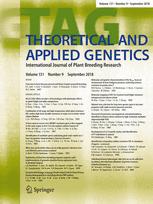The root-knot nematode [Meloidogyne incognita (Kofoid & White) Chitwood] (RKN) causes significant storage root quality reduction and yields losses in cultivated sweetpotato [Ipomoea batatas (L.) Lam.]. In this study, resistance to RKN was examined in a mapping population consisting of 244 progenies derived from a cross (TB) between ‘Tanzania,’ a predominant African landrace cultivar with resistance to RKN, and ‘Beauregard,’ an RKN susceptible major cultivar in the USA. We performed quantitative trait loci (QTL) analysis using a random-effect QTL mapping model on the TB genetic map. An RKN bioassay incorporating potted cuttings of each genotype was conducted in the greenhouse and replicated five times over a period of 10 weeks. For each replication, each genotype was inoculated with ca. 20,000 RKN eggs, and root-knot galls were counted ~62 days after inoculation. Resistance to RKN in the progeny was highly skewed toward the resistant parent, exhibiting medium to high levels of resistance. We identified one major QTL on linkage group 7, dominant in nature, which explained 58.3% of the phenotypic variation in RKN counts. This work represents a significant step forward in our understanding of the genetic architecture of RKN resistance and sets the stage for future utilization of genomics-assisted breeding in sweetpotato breeding programs.
Discovery of a major QTL for root-knot nematode (Meloidogyne incognita) resistance in cultivated sweetpotato (Ipomoea batatas)
Citation: Oloka, B. M., da Silva Pereira, G., Amankwaah, V. A., Mollinari, M., Pecota, K. V., Yada, B., Olukolu, B. A., Zeng, Z. B., & Craig Yencho, G. (2021b). Discovery of a major QTL for root-knot nematode (Meloidogyne incognita) resistance in cultivated sweetpotato (Ipomoea batatas). Theoretical and Applied Genetics. ISSN 1432-2242. 134(7). 1945–1955.
2021-09-11
GENETIC RESOURCES, GENETICS, GENOMICS AND CROP IMPROVEMENT SCIENCES GGCI, SWEETPOTATO AGRI-FOOD SYSTEMS, SWEETPOTATOES
journal_article

